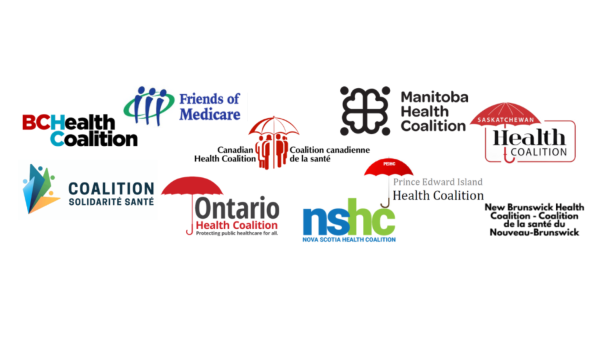Imagining public delivery of reproductive health care in a sea of privatization
I had the pleasure of being among the country’s foremost thinkers and activists on abortion access on May 27 at the Abortion Pathways and Abortion Obstacles in the Maritimes Symposium at the University of New Brunswick Law School.
The symposium was organized by Jula Hughes, dean of Lakehead University’s law school, and Tobin LeBlanc Haley, a professor in the University of New Brunswick Saint John’s sociology department. Hughes and LeBlanc Haley are the lead researchers on the Reproductive Justice Access Project NB.
Presenters included UNB nursing professor Martha Paynter who will present her research at the Canadian Heath Coalition’s Research Roundtable on June 20 and UNB law professor Nicole O’Byrne who delivered a talk on Medicare on its 60th anniversary for the Canadian Health Coalition.
At the symposium, I delivered a talk, ‘Imagining Public Delivery of Reproductive Health Care in a Sea of Privatization.’ I explored how successive Liberal and Progressive Conservative governments have permitted the creeping privatization of health care in New Brunswick and with it, the erosion of public health care and what that means for reproductive health care. I argued that reproductive health care, including abortion services, must not be left to private, for-profit actors to deliver.
As New Brunswick announces investments in teams-based care, it has an opportunity to include the public delivery of abortion services and other reproductive health care in such plans to bolster the public health care system and its compliance with ensuring access to medically necessary services.
New Brunswick is considered one of the provinces with the least access to abortion services. Only three of New Brunswick’s 20-some hospitals do abortions and two of those hospitals are in the same city, Moncton. Furthermore, Regulation 84-20, Section 2.01(b) of the Medical Services Payment Act effectively stops the funding of abortions outside of hospitals in New Brunswick, such as in clinical settings that are deemed to be more supportive environments for patients.
While the federal government deemed abortion services as medically necessary under the Canada Health Act in 1995, access to abortion care in New Brunswick has continued to not be universal nor equitable in the health care system. It was only recently that the Trudeau Liberal government started withholding a portion of the Canada Health Transfer to New Brunswick for failing to adequately provide abortion access.
A decade ago, former Liberal Premier Brian Gallant promised to remove all barriers to abortion access. While he abolished the archaic two-doctor rule that stopped self-referrals for abortions, he failed to remove the hospital restriction on Medicare-funded abortions and expand hospital abortion services outside of Moncton and Bathurst, which means that today, in 2024, there are fewer cities and locations in New Brunswick with abortion servinces than in the 1970s and 1980s, as pointed out by historian Christine Hughes at the symposium. Today, there are no abortion services in the province’s capital with the closure of Clinic 554 earlier this year. Clinic 554 was unable to stay open due to the funding restriction on hospital abortions. Clinic 554 like the Morgentaler Clinic before it never turned away anyone who could not afford to pay for an abortion.
Near the end of this tenure as premier in 2018, I asked Gallant to fund abortions at the clinic and he told he it is a “slippery slope to privatization.” Meanwhile, Gallant was privatizing other health care services, including New Brunswick’s celebrated extra-mural care and tele-care to the Moncton-based health services company, Medavie. That year, the Gallant government also renewed the 10-year Ambulance NB contract with Medavie Health Services without consulting the public. Of note, former Progressive Conservative Premier Bernard Lord has been the CEO of Medavie since 2016 after being on its board for eight years.
Privatization of health care in New Brunswick has long been opposed by health care workers organized under the NB Health Coalition, CUPE NB, the New Brunswick Nurses Union, and the New Brunswick Union.
The current Progressive Conservative government of Blaine Higgs, like other premiers across the country, argue for more privatization, saying that private delivery has always existed in the system. In recent years, private MRI clinics and for-profit plasma donation clinics have been allowed to set up in New Brunswick. Besides Ambulance New Brunswick, Tele-Care 811, the extra-mural program, the NB Health Link program is also run by Medavie Health Services. eVisitNB, a virtual after-hours clinic, is operated by Maple, a company that has been criticized for charging user fees. Virtual care has a place in our health care system but allowing the privatization of virtual care undermines the public health care system and quality of care as noted by the National Union of Public and General Employees (NUPGE).
The Canada Health Act, passed in 1984, effectively banned extra billing and user fees in Canada’s health care system. However, violations of the Canada Health Act have been on the rise in the form of user fees, access charges and extra billing. The violations are affecting equitable access to health care.
In March of this year, federal Minister of Health Mark Holland announced more than $79 million of the Canada Health Transfer was withheld from provinces and territories due to patients being charged for medically necessary services that should have been provided to their residents at no cost from 2021-2022. The majority of the deductions, more than $72 million, were withheld due to patient charges for diagnostic imaging services at private clinics.
The Canadian Health Coalition’s Steven Staples says it is Canada’s dirty secret that the Canada Health Transfer does not have to be spent on health care. The money from Ottawa flows into the general revenue of the provinces and territories to be used as they wish. Public health care advocates have long called for the enforcement of the Canada Health Act and for conditions on federal funding to be put on provinces and territories, including reining in private, for-profit delivery of publicly insured services.
As New Brunswick allows more procedures like cataract surgeries to be done in private clinics, reproductive justice advocates should be cautious about advocating for more private delivery and instead imagine what a truly public health care system, one that includes public delivery, could look like in Canada.
With an election year coming up, New Brunswick Liberal Party Leader Susan Holt has promised to oppose further health care privatization and to re-examine contracts with Medavie as part of a “refresh of the party.” Taking public services back from private interests is difficult, but it has been done. Politicians wanting our vote in next year’s elections need to be reminded that the role of federal and provincial governments is to ensure equitable access to health care for all residents, including access to reproductive health care.
Watch for many of the presentations from the symposium to be included in a special issue of the Journal of New Brunswick Studies in 2025.
Cover photo: Left-to-right: Tracy Glynn and Elizabeth Blaney, founders of Reproductive Justice NB at the Abortion Pathways and Abortion Obstacles in the Maritimes Symposium in Fredericton on May 27, 2024. Photo by Susan O’Donnell.
Tracy Glynn is the National Director of Projects and Operations for the Canadian Health Coalition


